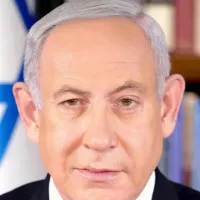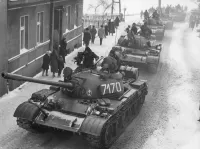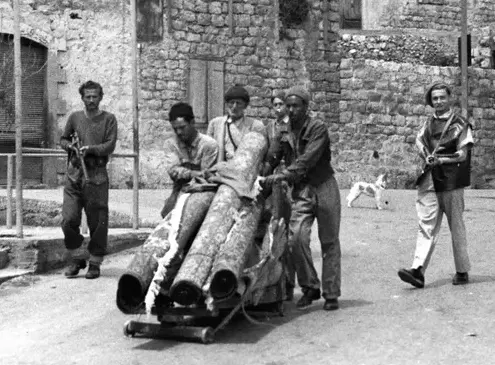The Nakba, meaning "catastrophe," refers to the events surrounding the 1948 Palestine War and the subsequent displacement and dispossession of Palestinian Arabs. It encompasses the destruction of Palestinian society, the loss of land and property, and the denial of the right of return for Palestinian refugees. The Nakba represents the fracturing of Palestinian society and the ongoing impact of these historical events on the Palestinian people.
1920: "Year of the Catastrophe"
Prior to 1948, the "Year of the Catastrophe" among Arabs referred to 1920, when European colonial powers partitioned the Ottoman Empire.
February 1947: British Declaration to End Mandate
In February 1947, following World War II and the Holocaust, the British declared they would end the Mandate and submit the future of Palestine to the newly created United Nations for resolution.
November 1947: UN Partition Plan for Palestine
In November 1947, the General Assembly passed Resolution 181 (II), known as the United Nations Partition Plan for Palestine, allocating about 55% of the land to Israel and the remaining 45% to Palestine, while designating Jerusalem and Bethlehem as an internationally governed corpus separatum.
December 1947: Massacres and Expulsions Begin
In December 1947, massacres and expulsions of Palestinian Arabs began, including massacres at Al-Khisas (December 18, 1947) and Balad al-Shaykh (December 31, 1947).
1947: UN Partition Plan
In 1947, the UN Partition Plan assigned 56% of Palestine to the future Jewish state, while the Palestinian majority (66%) were to receive 44% of the territory.
March 1948: Palestinian Displacement
By March 1948, between 70,000 and 100,000 Palestinians, mostly middle- and upper-class urban elites, were expelled or fled.
April 1948: Launch of Plan Dalet
In early April 1948, Israelis launched Plan Dalet, a large-scale offensive to capture land and empty it of Palestinian Arabs, capturing land allocated to Palestinians by the UN. Massacres and expulsions continued, including at Deir Yassin on April 9, 1948. Major Palestinian cities such as Tiberias, Haifa, Acre, and the Palestinian Arab neighborhood in West Jerusalem were depopulated, and Israel poisoned the water supplies of certain towns and villages.
May 1948: Israeli Declaration of Independence
In May 1948, almost half of the estimated 750,000 Palestinians (over 300,000) had fled or been expelled ahead of the Israeli Declaration of Independence. This was named as a casus belli for the entry of the Arab League into the country, sparking the 1948 Arab–Israeli War.
May 1948: Intervention by Arab States and Palestinian Exodus
In May 1948, the Secretary-General of the League of Arab States justified the intervention by Arab States, alleging that approximately over a quarter of a million of the Arab population had been compelled to leave their homes.
December 1948: UN Resolution 194
On December 11, 1948, the UN passed Resolution 194 which declared that Palestinians should be permitted to return to their homes and be compensated for lost or damaged property. The Resolution also established the United Nations Conciliation Commission.
1948: Internally Displaced Arab Citizens of Israel
As of 2003, approximately 274,000 Arab citizens of Israel, or one in four in Israel, were internally displaced from the events of 1948.
1948: Expulsion of Palestinians
During the foundational events of the Nakba in 1948, around 750,000 Palestinians, approximately half of Palestine's Arab population, were expelled from their homes through violence by Zionist paramilitaries and later by the Israeli military. Over 500 Arab towns and villages were depopulated and many settlements were destroyed or repopulated with Jews. Biological warfare was used to poison village wells, and by the war's end, Israel controlled 78% of Mandatory Palestine.
1948: Initial Palestinian Avoidance of the Term Nakba
For many years after 1948, Palestinian refugees in Lebanon avoided and even actively resisted using the term Nakba, as it lent permanency to a situation they viewed as temporary.
1948: Constantin Zureiq Applies Term Nakba
In 1948, Constantin Zureiq applied the term Nakba to the events of 1948 in his book Ma'na an-Nakba (The Meaning of the Disaster).
1948: The events of 1948
In 1948, according to Avraham Sela and Alon Kadish, the Palestinian national memory of the Nakba served contemporary Palestinian national demands. They also claim Palestinian historiography of the Nakba tends to ignore attacks launched by Arab forces against the Yishuv, downplaying the role of Palestinian leaders in the events leading to the 1948 war and defeat.
1948: Creation of Palestinian Statelessness
In 1948, all Arab Palestinians became immediately stateless as a result of the Nakba.
1948: Nakba During Palestine War
In 1948, during the Palestine war, the events of the Nakba are well established, documented, and widely agreed upon by most Israeli, Palestinian, and other historians.
1948: The Nakba
In 1948, the Nakba involved the ethnic cleansing of Palestinian Arabs through violent displacement, dispossession of land and property, destruction of their society, and suppression of their culture and political rights.
1948: Commemoration of Nakba Day
In 1948, the events of the Palestine war led to the annual observance of May 15 as Nakba Day by Palestinians, and has influenced Palestinian culture and identity through symbols like Handala, the keffiyeh, and the Palestinian 1948 keys, inspiring numerous books, songs, and poems.
1948: Morris Debate of "ethnic cleansing" label
In 2016, Benny Morris rejected the description of "ethnic cleansing" for the events of 1948, but stated that the label of "partial ethnic cleansing" for 1948 was debatable.
1948: Abbas Criminalizes Nakba Denial
In May 2023, following the 75th anniversary of the Nakba, Palestinian president Mahmoud Abbas made the denial of the 1948 expulsion a crime punishable by two years in jail.
1948: Continued Expulsions and Expansion
In the autumn of 1948, expulsions, massacres, and Israeli expansion continued. This period saw the depopulation of Beersheba (October 21, 1948), the al-Dawayima massacre (October 29, 1948), and the Safsaf massacre (also October 29, 1948). Israel converted the ad hoc military governates ruling over Palestinian Arabs in Israel into a formal military government, controlling nearly all aspects of their lives.
1948: Anti-Repatriation Policies
In the summer of 1948, Israel began implementing anti-repatriation policies to prevent the return of Palestinians to their homes. A Transfer Committee coordinated efforts to prevent Palestinian return, including destroying villages, resettling Arab villages with Jewish immigrants, confiscating land, and disseminating propaganda. Over 50,000 Palestinians were expelled from Lydda and Ramle (July 9-13, 1948).
1948: United Nations Commemorates Palestinian Nakba
On 17 May 2024, the United Nations commemorated the Palestinian Nakba for a second year, calling on the international community to redouble its efforts to end the Israeli occupation. An event, "1948-2024: The Continuing Palestinian Nakba" was also held.
1948: Arab League Armies Enter Palestine
On May 15, 1948, Arab League armies entered the territory of former Mandatory Palestine, beginning the 1948 Arab–Israeli War. After the end of the Mandate, Israel seized more land allocated to the Palestinians, and expulsions, massacres, and the destruction of villages in rural areas increased.
1948: Emergence of the "Ongoing Nakba" Phrase
Since the late 1990s, the phrase "ongoing Nakba" has emerged to describe the continuous experience of violence and dispossession experienced by the Palestinian people since 1948. This term enjoins the understanding of the Nakba not as an event in 1948, but as an ongoing process that continues through to the present day.
1948: Palestinian National Identity as Victims
The Palestinian national narrative regards the repercussions of the Nakba as a formative trauma defining its national, political and moral aspirations and its identity after the 1948 war.
1948: Denial of Nakba and Zionist Narratives
The denial of the Nakba is central to Zionist narratives of 1948.
July 1949: Armistices Signed
Armistices formally ending the war were signed between February and July 1949, but massacres and expulsions of Palestinians continued in 1949 and beyond.
1949: Continuation of the Nakba
After the end of the war in 1949, the Nakba continued as Israel prevented Palestinian refugees from returning. More Palestinian towns and villages were destroyed, with new Israeli settlements established in their place. Palestinian place names and the name "Palestine" itself were removed from maps and books.
1949: Depopulation and Destruction of Palestinian Towns and Villages
Before, during and after the 1947–1949 war, hundreds of Palestinian towns and villages were depopulated and destroyed.
July 1952: Israeli Nationality Law Denationalizes Palestinians
On 14 July 1952, the first Israeli Nationality Law was passed, denationalizing Palestinians, rendering the former Palestinian citizenship "devoid of substance".
1952: Founding of the Arab Nationalist Movement
In 1952, Constantin Zureiq's students founded the Arab Nationalist Movement group, one of the first post-Nakba Palestinian political movements.
1953: Qibya Massacre
In 1953, sixty-nine Palestinians were killed in the Qibya massacre.
1955: Muhammad Nimr al-Hawari Writes "Sir al Nakba"
In 1955, Muhammad Nimr al-Hawari used the term Nakba in the title of his book Sir al Nakba (The Secret behind the Disaster).
1956: Kafr Qasim Massacre
In 1956, on the first day of the Suez Crisis, 49 Palestinians were killed in the Kafr Qasim massacre.
1958: Aref al-Aref Publishes Encyclopedia on Nakba
Between 1958 and 1960, Aref al-Aref published a six-volume encyclopedia Al-Nakba: Nakbat Bayt al-Maqdis Wal-Firdaws al-Mafqud (The Catastrophe: The Catastrophe of Jerusalem and the Lost Paradise).
1960: Aref al-Aref Publishes Encyclopedia on Nakba
Between 1958 and 1960, Aref al-Aref published a six-volume encyclopedia Al-Nakba: Nakbat Bayt al-Maqdis Wal-Firdaws al-Mafqud (The Catastrophe: The Catastrophe of Jerusalem and the Lost Paradise).
1966: End of Martial Law
In 1966, the strict martial law imposed on Palestinians in Israel was lifted.
1976: Siege of Tel al-Zaatar Massacre
In 1976, during the Lebanese Civil War, approximately two thousand Palestinians were killed in a massacre led by the Lebanese Front at the Siege of Tel al-Zaatar.
1987: First Intifada Begins
In 1987, the First Intifada began and lasted until the 1993 Oslo Accords.
1990: Palestinian Exodus from Kuwait
The Nakba was the primary cause of the Palestinian diaspora. In 1990, there was a Palestinian exodus from Kuwait.
1993: Oslo Accords
The First Intifada lasted until the 1993 Oslo Accords.
1998: The term 'Nakba denial' was used
The term 'Nakba denial' was used in 1998 by Steve Niva, editor of the Middle East Report, in describing how the rise of the early Internet led to competing online narratives of the events of 1948.
2000: Second Intifada Begins
In 2000, the Second Intifada began.
2003: Internally Displaced Arab Citizens of Israel
As of 2003, approximately 274,000 Arab citizens of Israel, or one in four in Israel, were internally displaced from the events of 1948.
2004: Morris Justifies 'Cleansing' the Hinterland
In 2004, Benny Morris responded to claims of "ethnic cleansing" occurring in 1948 by stating that there were "circumstances in history that justify ethnic cleansing" when the alternative was "genocide". He stated that it was necessary to "cleanse the hinterland" and that there was no choice but to expel the Palestinian population, resulting in a "partial" expulsion of Arabs.
May 2009: Yisrael Beiteinu Introduces Bill Outlawing Nakba Commemorations
In May 2009, Yisrael Beiteinu introduced a bill that would outlaw all Nakba commemorations, with a three-year prison sentence for such acts of remembrance. The prison sentence was later dropped.
2009: Israeli Education Ministry Bans Nakba in Textbooks
In 2009, the Israeli Education Ministry banned using the term "nakba" in textbooks for Arab children.
March 2011: Knesset Approves Nakba Law
In March 2011, the Knesset approved the Nakba Law, which allowed the Minister of Finance to reduce state funding for Israeli institutions found to be "commemorating Independence Day or the day of the establishment of the state as a day of mourning".
2011: Nakba Law Passed
In 2011, Israel passed the Nakba Law, which denies government funding to institutions that commemorate the Nakba.
2011: Nakba Law and Commemoration
The 2011 'Nakba Law' authorized the withdrawal of state funds from organizations that commemorate the day on which the Israeli state was established as a day of mourning, or that deny the existence of Israel as a "Jewish and democratic state."
2016: Morris Rejects Ethnic Cleansing Description
In 2016, Benny Morris rejected the description of "ethnic cleansing" for the events of 1948, but stated that the label of "partial ethnic cleansing" for 1948 was debatable.
May 2023: Abbas Criminalizes Nakba Denial
In May 2023, following the 75th anniversary of the Nakba, Palestinian president Mahmoud Abbas made the denial of the 1948 expulsion a crime punishable by two years in jail.
October 2023: Destruction of Al Qarara Cultural Museum
In October 2023, the Al Qarara Cultural Museum, which held a collection of pre-Nakba jewellery, was destroyed in an explosion as a result of an Israeli attack.
November 11, 2023: Israeli Minister Remarks on Gaza War and '2023 Gaza Nakba'
On November 11, 2023, Israeli Agriculture Minister Avi Dichter remarked in an interview on N12 News on the nature of the Gaza war that it's the '2023 Gaza Nakba'.
2023: Farha film submission for 2023 Academy Awards
In 2023, Farha, a film about the Nakba directed by Jordanian director Darin J. Sallam, was chosen as Jordan's official submission for the 2023 Academy Awards International Feature Film category. In response, Avigdor Lieberman, the Israeli Finance Minister, ordered the treasury to withdraw government funding for Jaffa's Al Saraya Theater, where the film was scheduled for projection.
2023: Israeli Ambassador Denounces UN Commemoration Day for Nakba
In 2023, after the United Nations instituted a commemoration day for the Nakba on 15 May, the Israeli ambassador Gilad Erdan remonstrated that the event itself was antisemitic.
2023: Gaza War and "Gaza Nakba 2023"
The 2023 Gaza war has caused the highest Palestinian casualties since the 1948 war, raising fears of history repeating itself. Israeli Agricultural Minister Avi Dichter's remark about "Gaza Nakba 2023" was rebuked by Prime Minister Benjamin Netanyahu.
May 2024: United Nations Commemorates Palestinian Nakba
On 17 May 2024, the United Nations commemorated the Palestinian Nakba for a second year, calling on the international community to redouble its efforts to end the Israeli occupation. An event, "1948-2024: The Continuing Palestinian Nakba" was also held.
Mentioned in this timeline

Benjamin Bibi Netanyahu is a prominent Israeli politician and diplomat...

Martial law is the imposition of military rule in place...
World War II - was a global conflict between the...

News encompasses information about current events disseminated through various media...
Palestine officially the State of Palestine is a country in...
Lebanon is a country in the Levant region of West...
Trending

8 months ago Naz Reid's pivotal role: Timberwolves' series hinges on his Game 3 adjustment.

9 months ago Jake Gyllenhaal's 'Othello' Snubbed by Tony Awards Despite Box Office Success with Denzel Washington.
Nicholas Ovundah Eze Emmanwori is an American professional football safety for the Seattle Seahawks of the NFL He played college...

Cooper Kupp is a professional American football wide receiver renowned for his exceptional skills and achievements in the NFL He...
Kyle Shanahan is the head coach of the San Francisco ers He gained recognition as the offensive coordinator for the...
3 months ago Sling TV Settles California Data Privacy Lawsuit for $530,000 amid Data Selling Allegations
Popular

XXXTentacion born Jahseh Dwayne Ricardo Onfroy was a controversial yet...

William Franklin Graham III commonly known as Franklin Graham is...

Thomas Douglas Homan is an American law enforcement officer who...
Matt and Ross Duffer known as the Duffer Brothers are...

Martin Luther King Jr was a pivotal leader in the...
Curt Cignetti is an American college football coach currently the...
